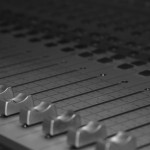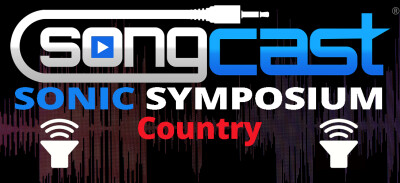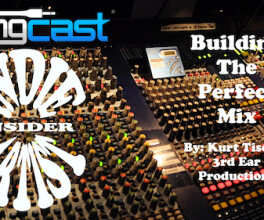Advances in technology and recording equipment have enabled indie artists to become more diy than ever before. Home recording equipment abounds, but studio recording remains steady. So what are the pros and cons of home vs. studio recording?
more diy than ever before. Home recording equipment abounds, but studio recording remains steady. So what are the pros and cons of home vs. studio recording?
Five points to consider:
- Cost: While home recording may seem like the obvious cost effective route, working with a professional engineer or producer may be more productive. Consider the amount of time and effort it will take when recording at home. If it’s going to take months, consider the commitment. Time is money.
- People: When recording at home or looking for a studio, it’s not about the where, and it’s not about the glitz of the studio or the amenities or the food service. It’s about the who. Whether in a studio or at home, surround yourself with people who are passionate about your sound. They will spend more time working with you and that will yield better results.
- Rooms: Whether you’re recording in your bathroom for the great acoustics or at a Fifth Avenue recording studio, finding the right space to record in is key.
- Equipment: There is a learning curve for new equipment. If you’re going the diy route, consider the time it will take you to learn the ins and outs of new equipment. Do you have the time and patience or is that better left to the professionals?
- Time: Whether recording in a studio or at home, beware of time. If it turns into a big a project, you may have to fork over big bucks at the studio. Or consider your personality; will you loose steam recording at home if the project drags on?
When deciding to go the home recording or studio recording route, it’s important to consider these factors. As an indie musician, you want to create the best possible end product and weigh all of your options before making a decision.
Tell us what you think! Have you recorded at home? Or did you go to a studio? Do you have any pros and cons to share?
Up next: Content is King: videos, behind the scenes and live tracks.
The SongCast Crew











































I find the main problem with recording at home is that the technology gets in the way of the creativity. I prefer to work where somewhere else has to look after the equipment so I can just do the music.
Great point, Martin. Thanks for sharing.
Hi I’ve had the fortune of recording both ways ,I myself prefer home studio because of the comfort factor of your own surrondings. I use this for Preproduction but good idea to goto RecordingStudio for mixing .Though I have a partner with built to order room we get exellent mixes
Nice! Thanks for your comment.
I would LOVE to record in a recording studio. The “problem” is the money!!! When you can´t afford it, what can you do?
I have always favoured the home studio. I first started out on 4 track cassette, which needed a lot of skill to get really clean recordings and good separation in the mixes. Now I use a 32 track hard drive recorder with built in effects and mixing desk, once you get up to using this type of machine you can get excellent quality, clean recordings, then all you have to do is mix down the tracks and play them on various machines – car,
house hi fi,computer etc and work out how to alter eq to get balance that sounds good across all players then make your recoding of the final mix to cd or whatever medium you use. You can pick up brilliant hard drive recorders for very little money these days, and you learn more doing it this way.
Helpful info, Keith. Thanks for the comment
I get the sound I want at home…nobody can duplicate it…from experience I know this, I know how to do it right for me.
You be the judge 😉
Thanks,
D
I started recording at home using a 4 track tape set-up then moved onto recording with a PC. Started off with a soundblaster card and learned a lot about MIDI. Then bought a Yamaha SW60 soundcard that gave you the ability to be a bit more creative and technically gave a better sound overall. Since then moved onto audio recording in a serious way, using the Lynx Two soundcard (you need good audio/digital converters in a soundcard and you have to pay a price to get good quality ones), then added a Yamaha O1X digital mixer/audio interface and controller. A good hands-on mixer, using it to control Cubase (great to use real faders, rather than a mouse), but a steep learning curve, setting the mixer up and getting around the idea of busses/auxilleries/sends/returns/inserts and using VST plug-ins. Then mixing/pre-mastering and finally mastering the wave file. I would say mastering is the most difficult to get right and an independent ear, if I could afford it, in a studio setting at this point in the production process would be most useful.
As the former owner of a top-end professional recording studio; I’d have to say the most common and cost-effective way to go about recording your new album or EP is to utilise both pro & home recording.
The majority of bands that weren’t signed to a major label would save up some money to record their ryhthm beds (drum & bass) onto our 24track 2″ tape machines, then dump the tracks into Protools digital (or similar) to take home.
This way, they’re able to start with an awesome sounding, pro-quality foundation. They may then build on it to their heart’s content at home, overdubbing guitars, keys etc until they’re satisfied with the results.
The band then returns to the studio to track vocals through rare & expensive mics, and have the results mixed & mastered and ready for pressing their CD run.
It’s more or less a ‘best of both worlds’ solution that doesn’t require huge funding, and the time in-between at home also allows the artist to save up some more dosh for the return trip to the studio.
Good luck with whatever music ya make, just keep makin’ it!
That right after been around and understanding instruntment all your when go to recording the sound that in your head or in your hand book to get that great sound that hear is looking for it going to take people that understand and willing work just as hard as you for the sound that you want to produce . Song cast good staff .
I started recording in 1965 with a one track reel to reel, no mixing. I like the live sound. Today I use the one track windows recorder. It is easy, and i think one gets a true recording of what one sounds like. The art is more important the the tech stuff.